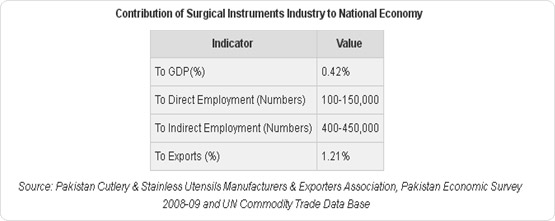Pakistan and Germany are the only two major suppliers of surgical instruments in the world. Korea,
France, Hungary, Poland and England are also in the field but their exports are negligible. In terms
of cheap labor, 100-year old localized skills, suitable monetary and fiscal incentives, and
world-wide reputation, Pakistan has all those textbook advantages which are associated with
localization of industries. However, technological and managerial inadequacies, with reference
to fastly changing global medical requirements, and advanced countries' protectionist policies
stand in the way of Pakistani exporters capturing the entire world market.
Exports of surgical instruments accounted for only 1.4 per cent of Pakistan's total exports in
1990-91 but during the decades 1980-90 they increased at an average annual rate of over 22 per cent.
This growth continues unabated. However, the industry presently consists of about 400 small and medium
labor intensive production units, providing jobs to over 40,000 workers. Joint-venturing and
subcontracting with small skilled workers or makers is quite common. The number of registered
exporters and manufacturers-cum-exporters has reached the figure of 2000, though the major
international suppliers are about two dozens
The surgical instruments industry in Pakistan is pointed towards Sialkot exports around 80-90 percent
of its products to over 140 countries around the world.
The surgical area comprises of 2300 companies, of which around 30 can be considered large and the
remainder can be split as 150 units of medium sized and remaining as small. The industry produces
on average over 150 million pieces a year with an estimated value of around Rs 22 billion. Out of
the total production, approximately over 95% is exported one. The industry belongs to the light
engineering industry category, and is one that has specialized in skill and stable export market
share

The rampant growth and progress shown in the surgical goods industry is a good indicator that there is high amount of room present in the international market for Pakistan to capture and make its feet stable in the market.